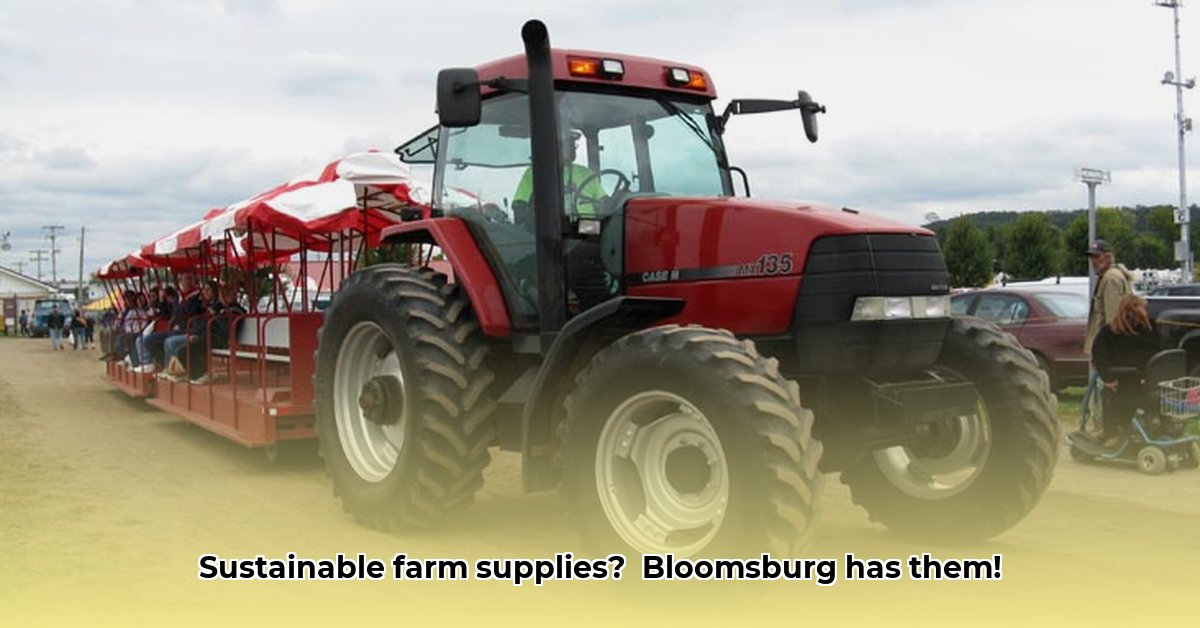
Tractor Supply Bloomsburg Pennsylvania: Your Guide to Sustainable Farming
Finding the right supplies for your farm can be challenging. Tractor Supply (TSC) in Bloomsburg, Pennsylvania, offers a wide range of products, but how effectively does it support sustainable agricultural practices? This article explores TSC's role in sustainable farming, providing practical guidance for environmentally conscious farmers and actionable recommendations for TSC. It's designed to empower both farmers and the company in achieving greater sustainability. For more information on sustainable practices at TSC, check out this helpful resource.
Sustainability at Tractor Supply Bloomsburg: The Current Landscape
A significant challenge is the lack of readily available information on the sustainability of TSC's product offerings in Bloomsburg. Determining the extent to which their products are organically sourced or sustainably produced requires further investigation. Transparency is crucial. "More transparency from the company would really help both customers and the environment," explains Dr. Emily Carter, Agricultural Sustainability Expert at Penn State University. The absence of clear labeling makes it difficult for farmers to make informed, eco-conscious choices.
This lack of data highlights a need for improvement. While TSC provides a convenient location for acquiring necessary farming supplies—a significant benefit to local farmers—the absence of clear sustainability initiatives creates an opportunity for growth. Dr. Carter further emphasizes that "increasing transparency is a significant step toward encouraging sustainable choices among farmers." This is a key area where improvements could significantly benefit both the farm and the environment.
Taking Action: Steps Toward a Greener Future
To address this challenge, both TSC and the broader agricultural community can implement various strategies:
For Tractor Supply Company:
Short-Term Goals (0-1 year): Conduct a comprehensive product inventory review to identify and clearly label sustainably produced goods. Implement prominent labeling and potentially a dedicated in-store section for eco-friendly products. This will immediately improve consumer awareness and choice.
Long-Term Goals (3-5 years): Establish partnerships with suppliers specializing in organic and sustainable agricultural goods to expand the range of eco-friendly options. Develop and offer workshops or educational resources, including webinars and in-person sessions, to educate farmers about sustainable farming techniques.
For Pennsylvania Farmers:
Short-Term Actions: Make informed choices while shopping at TSC based on available information, prioritizing products with clear sustainability certifications where possible.
Long-Term Actions: Actively communicate your desire for a wider selection of eco-friendly products to TSC. Consider joining farmer cooperatives to leverage collective buying power and access better deals on sustainable supplies.
For Environmental Organizations:
Short-Term Actions: Advocate for TSC to expand its offering of sustainably sourced products through direct engagement and public campaigns. Push for clearer labeling and verified sustainability claims.
Long-Term Actions: Collaborate with TSC on educational initiatives to promote sustainable agricultural practices and support improvements throughout their supply chain.
For Government Agencies:
Short-Term Actions: Implement incentives for adopting sustainable agricultural practices, including tax breaks or grants for farmers using eco-friendly products. Encourage retailers like TSC to expand their sustainable product offerings.
Long-Term Actions: Invest in research on sustainable farming methods tailored to Pennsylvania's specific environmental conditions, fostering innovation and adaptation.
Location, Location, Location: The Geographic Factor
The geographical location of TSC and other similar stores significantly impacts access to sustainable supplies. Farmers in rural areas might face challenges due to distance and limited stock. Addressing this uneven access is essential for promoting equitable sustainability across the region. Furthermore, the price disparity between conventional and sustainable products poses a significant barrier, especially for farmers with limited budgets.
The Future of Sustainable Farming in Pennsylvania: A Collaborative Effort
Achieving sustainable agriculture in Pennsylvania requires a collaborative effort among farmers, retailers like TSC, environmental organizations, and government agencies. Increased transparency, a broader range of sustainable products, and farmer education are crucial for building a truly sustainable agricultural system. Balancing economic needs with environmental concerns requires ongoing dialogue and innovation. This collaborative approach is fundamental to improving sustainability in Pennsylvania agriculture.
How to Find Sustainable Farming Supplies at Tractor Supply in Pennsylvania
Key Takeaways:
- TSC offers a wide range of products that can contribute to sustainable farming.
- TSC’s widespread rural presence improves access for many farmers.
- TSC's current lack of clear sustainability initiatives represents a key opportunity for improvement.
- Careful consideration of product origins and certifications is crucial for sustainable sourcing.
- Consumers can actively promote sustainability by supporting responsible sourcing practices.
Navigating the Aisles for Sustainable Choices
Finding sustainable supplies at TSC requires proactive engagement. Look for products with certifications like OMRI (Organic Materials Review Institute) for organic products. Prioritize locally sourced animal feed to reduce transport emissions and support local businesses. The emphasis should be on quality and durability, reducing long-term waste.
Understanding the Indirect Approach
TSC's product range indirectly supports sustainable practices. Therefore, informed consumer choices are essential. By asking questions about sourcing, advocating for more sustainable options, and supporting local initiatives, consumers can significantly influence the company's sustainability efforts.
A Step-by-Step Guide to Sustainable Shopping at TSC
- Identify your needs: Determine your specific sustainable farming goals.
- Research products: Examine ingredient lists, certifications (e.g., OMRI), and origin information.
- Compare options: Assess the environmental impact when making choices.
- Choose quality and durability: Invest in long-lasting tools and equipment.
- Advocate for change: Communicate your preferences and concerns to TSC staff.